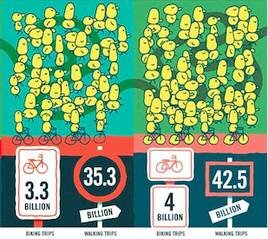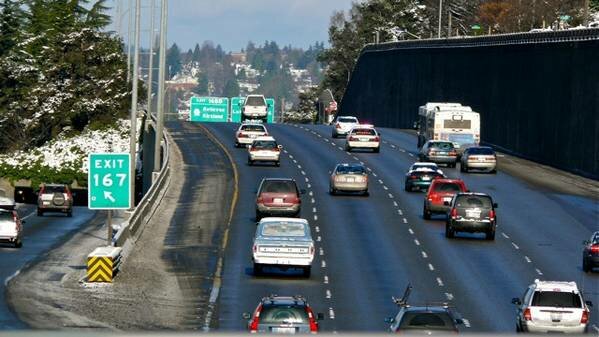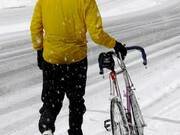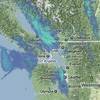And now a video preview of what you're likely to see tonight, once the roads ice back up. People, charge your cameras! If you're driving, a safety tip: Avoid really steep hills.
...
Ford is looking for adventurous individuals to participate in live auditions for "Focus Rally: America," a real-time interactive road rally starring the new 2012 Ford Focus, to be produced by Ford and the creators of The Amazing Race.
The rally, which will be streamed real-time on HULU, will feature six teams competing to complete tasks in a challenging cross-country road rally adventure to win a $100,000 grand prize, plus ten new Focuses for fans and supporters of the winning team.
WHEN: Wednesday, Oct. 27, 5 to 8 p.m.
WHERE: Pyramid Brewery and Alehouse, 1201 First Ave S., Seattle, WA 98134
DETAILS: For more information, go to www.focusrally.com.
 (via Fast Company) An infographic courtesy of GOOD and Part & Parcel shows how U.S. Department of Transportation spending on walking and biking has resulted in a lot more walking and biking going on.
(via Fast Company) An infographic courtesy of GOOD and Part & Parcel shows how U.S. Department of Transportation spending on walking and biking has resulted in a lot more walking and biking going on.
It seems hard to believe, but the DOT budget for bicycles and pedestrian programs in 1990 was just $6 million. By 2009, that had grown to $1.2 billion (still a laughably tiny number). But bike trips had more than doubled, from 1.7 billion trips to four, and walking trips had grown from 18 billion to 42.5.
It may seem crushingly obvious--that making it easier, or even possible, for people to walk and bike results in more walkers and bikers--but the 15-year infographic also shows the importance of sustained funding when it comes to breaking a habit like hopping in a car.
In Seattle, the $240-million Bicycle Master Plan calls for a 450-mile network of paths, lanes, and sharrows. SDOT estimates that "between 4,000 and 8,000 people bicycle commute in Seattle each day," and that, recreationally, 36 percent of Seattle bikes. As proof of the force of the "what's measured is what matters" mindset, SDOT's progress on this front is trumpeted in terms of miles implemented, rather than usage.
Given all this, you might be surprised to learn that the Northwest's gasoline consumption rose last year (both in absolute and per capita measures). Sightline's study of gas consumption notes we broke a decade-long decline of 15 percent--they chalk the increase up to lower gas prices. (Really, the big gas hogs turn out to be Idahoans; for Washington it's a slight uptick.)
Revisiting the lesson learned at the outset of this post--if you fund it, they will come--Sightline's Eric de Place and Clark Williams-Derry write with concern that:
At present, each of the Northwest’s three major metropolises is moving forward with expensive highway expansions, including a new Port Mann Bridge, east of Vancouver, BC (Can$2.4 billion), the Highway 520 floating bridge replacement between Seattle and Bellevue ($4.6 billion), and the Interstate 5 Columbia River Crossing between Vancouver, Washington and Portland ($3.2 billion)
Fascinating, isn't it? The cost of the 520 floating bridge is roughly four times the U.S. DOT expenditure on bicycling and walking programs of $1.2 billion, an amount only made possible by the "Safe, Accountable, Flexible, Efficient Transportation Equity Act: A Legacy for Users." Equity seems not, in the words of Inigo Montoya, to mean what I think it means.
As of June 9, 2010, pending Governor Gregoire's signature, talking or texting on a cell phone while driving will be a primary offense. (A headset is okay, and there are multiple provisions for emergencies.) The House passed a stricter bill than they initially presented, making it align with the Senate version. Now police will be able to write a $124 ticket to anyone not using a headset on that basis alone. The HeraldNet quotes Sen. Tracey Eide, D-Federal Way, the bill's sponsor, saying:
I've fought for this for 10 years, and sometimes I thought this day would never come. Maybe now people will pay attention to their driving instead of their conversations.
Parents who want to get a jump on helping their teens quit the texting-while-driving habit have an assortment of smart phone apps available to them. All cost less than that $124.
 Go on. Guess how many are on cellphones.
Go on. Guess how many are on cellphones.
SB 6345--the Senate bill that would make (non-handsfree) cell phone use while driving a $124 ticket and a primary offense--was placed on second reading by the Rules Committee yesterday. (I have no idea what that means, outside of a sense of progress. There's no lyric about "second reading by Rules Committee" in Schoolhouse Rock's "How a Bill Becomes a Law.") With eleven senators sponsoring, it may have enough momentum to pass.
Its House counterpart, HB 2365, had a public hearing by the House transportation committee on the 18th, with no doings reported since then.
But the Highway Loss Data Institute--an insurer-funded nonprofit organization--has just released a study showing that anti-cell phone laws have had no effect on the number of collisions. As KING TV reports, the study compares "insurance claims for crash damage in four jurisdictions before and after bans were enacted in California, New York, Connecticut, and Washington, DC."...
This week City of Seattle attorney Tom Carr and Senate Judiciary Chair Adam Kline (D-37) spoke at a Traffic Justice Summit at City Hall, sponsored by the Cascade Bicycle Club. For the benefit of the non-cycling crowd, what's at issue is how difficult it is to charge drivers who kill cyclists or pedestrians as a result of a traffic infraction with a commensurate crime.
There is the vehicular manslaughter option, but as this requires proof of recklessness or disregard for the safety of others, it's not much used, except in cases involving drunk driving. Drunkenness is easier to prove than recklessness, and in any event, carelessness kills someone just as dead. (Talking on a cell phone, for instance, isn't recklessness.)
As Publicola's ECB reports, Carr is in favor of "making it a crime, punishable by up to a year in jail, to kill someone while committing a traffic infraction."
But it goes a little further than that, to include serious injury. Seattlepi.com says the proposed "Vulnerable User" bill would "expand...









Most Recent Comments